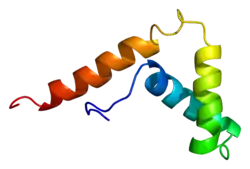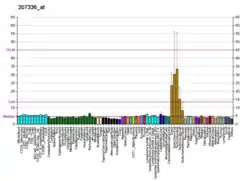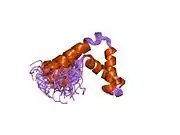SOX5
Transcription factor SOX-5 is a protein that in humans is encoded by the SOX5 gene.[5][6]
Function
This gene encodes a member of the SOX (SRY-related HMG-box) family of transcription factors involved in the regulation of embryonic development and in the determination of the cell fate. The encoded protein may act as a transcriptional regulator after forming a protein complex with other proteins. The encoded protein may play a role in chondrogenesis. A pseudogene of this gene is located on chromosome 8. Multiple transcript variants encoding distinct isoforms have been identified for this gene.[6]
See also
References
- GRCh38: Ensembl release 89: ENSG00000134532 - Ensembl, May 2017
- GRCm38: Ensembl release 89: ENSMUSG00000041540 - Ensembl, May 2017
- "Human PubMed Reference:". National Center for Biotechnology Information, U.S. National Library of Medicine.
- "Mouse PubMed Reference:". National Center for Biotechnology Information, U.S. National Library of Medicine.
- Wunderle VM, Critcher R, Ashworth A, Goodfellow PN (Sep 1996). "Cloning and characterization of SOX5, a new member of the human SOX gene family". Genomics. 36 (2): 354–8. doi:10.1006/geno.1996.0474. PMID 8812465.
- "Entrez Gene: SOX5 SRY (sex determining region Y)-box 5".
Further reading
- Kamachi Y, Uchikawa M, Kondoh H (Apr 2000). "Pairing SOX off: with partners in the regulation of embryonic development". Trends in Genetics. 16 (4): 182–7. doi:10.1016/S0168-9525(99)01955-1. PMID 10729834.
- Bowles J, Schepers G, Koopman P (Nov 2000). "Phylogeny of the SOX family of developmental transcription factors based on sequence and structural indicators". Developmental Biology. 227 (2): 239–55. doi:10.1006/dbio.2000.9883. PMID 11071752.
- Wilson M, Koopman P (Aug 2002). "Matching SOX: partner proteins and co-factors of the SOX family of transcriptional regulators". Current Opinion in Genetics & Development. 12 (4): 441–6. doi:10.1016/S0959-437X(02)00323-4. PMID 12100890.
- Schepers GE, Teasdale RD, Koopman P (Aug 2002). "Twenty pairs of sox: extent, homology, and nomenclature of the mouse and human sox transcription factor gene families". Developmental Cell. 3 (2): 167–70. doi:10.1016/S1534-5807(02)00223-X. PMID 12194848.
- Denny P, Swift S, Brand N, Dabhade N, Barton P, Ashworth A (Jun 1992). "A conserved family of genes related to the testis determining gene, SRY". Nucleic Acids Research. 20 (11): 2887. doi:10.1093/nar/20.11.2887. PMC 336939. PMID 1614875.
- Connor F, Cary PD, Read CM, Preston NS, Driscoll PC, Denny P, Crane-Robinson C, Ashworth A (Aug 1994). "DNA binding and bending properties of the post-meiotically expressed Sry-related protein Sox-5". Nucleic Acids Research. 22 (16): 3339–46. doi:10.1093/nar/22.16.3339. PMC 523727. PMID 8078769.
- Maruyama K, Sugano S (Jan 1994). "Oligo-capping: a simple method to replace the cap structure of eukaryotic mRNAs with oligoribonucleotides". Gene. 138 (1–2): 171–4. doi:10.1016/0378-1119(94)90802-8. PMID 8125298.
- Bonaldo MF, Lennon G, Soares MB (Sep 1996). "Normalization and subtraction: two approaches to facilitate gene discovery". Genome Research. 6 (9): 791–806. doi:10.1101/gr.6.9.791. PMID 8889548.
- Suzuki Y, Yoshitomo-Nakagawa K, Maruyama K, Suyama A, Sugano S (Oct 1997). "Construction and characterization of a full length-enriched and a 5'-end-enriched cDNA library". Gene. 200 (1–2): 149–56. doi:10.1016/S0378-1119(97)00411-3. PMID 9373149.
- Lefebvre V, Li P, de Crombrugghe B (Oct 1998). "A new long form of Sox5 (L-Sox5), Sox6 and Sox9 are coexpressed in chondrogenesis and cooperatively activate the type II collagen gene". The EMBO Journal. 17 (19): 5718–33. doi:10.1093/emboj/17.19.5718. PMC 1170900. PMID 9755172.
- Uusitalo H, Hiltunen A, Ahonen M, Gao TJ, Lefebvre V, Harley V, Kähäri VM, Vuorio E (Oct 2001). "Accelerated up-regulation of L-Sox5, Sox6, and Sox9 by BMP-2 gene transfer during murine fracture healing". Journal of Bone and Mineral Research. 16 (10): 1837–45. doi:10.1359/jbmr.2001.16.10.1837. PMID 11585348. S2CID 42947355.
- Zafarana G, Gillis AJ, van Gurp RJ, Olsson PG, Elstrodt F, Stoop H, Millán JL, Oosterhuis JW, Looijenga LH (Mar 2002). "Coamplification of DAD-R, SOX5, and EKI1 in human testicular seminomas, with specific overexpression of DAD-R, correlates with reduced levels of apoptosis and earlier clinical manifestation". Cancer Research. 62 (6): 1822–31. PMID 11912161.
- Ikeda T, Zhang J, Chano T, Mabuchi A, Fukuda A, Kawaguchi H, Nakamura K, Ikegawa S (Sep 2002). "Identification and characterization of the human long form of Sox5 (L-SOX5) gene". Gene. 298 (1): 59–68. doi:10.1016/S0378-1119(02)00927-7. PMID 12406576.
This article is issued from Wikipedia. The text is licensed under Creative Commons - Attribution - Sharealike. Additional terms may apply for the media files.






